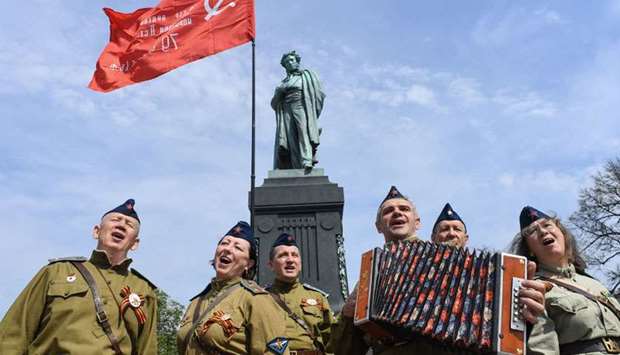* Putin won landslide re-election in March
* Is due to be inaugurated for a fourth term on Monday
* Opponents liken him to an autocratic Tsar
* Supporters laud him as father of the nation
Critics of Vladimir Putin took to the streets of Russia on Saturday ahead of his inauguration for a fourth presidential term to register their opposition to what they say is his autocratic Tsar-like rule.
Putin won a landslide re-election victory in March, extending his grip over the world's largest country for another six years until 2024, making him the longest-lasting leader since Soviet dictator Josef Stalin who ruled for nearly 30 years.
"If you think that he is not our Tsar, take to the streets of your cities," read a message from opposition leader Alexei Navalny encouraging people to demonstrate ahead of the protests.
"We will force the authorities, made up of swindlers and thieves, to reckon with the millions of citizens who did not vote for Putin."
Navalny, who has been repeatedly detained and jailed for organising similar protests in the past, called for rallies in more than 90 towns and cities, including Moscow and St Petersburg where protests were due to start at 1100 GMT.
Navalny activists posted photographs on social media of hundreds of protesters taking part in rallies in Russia's Far East and Siberia, and OVD Info, a human rights organisation that monitors detentions, said it had received reports of police detaining around 20 people across the country.
"Putin has already been on his throne for 18 years!" one activist told a crowd in the city of Khabarovsk.
"We've ended up in a dead end over these 18 years. I don't want to put up with this!"
Putin, 65, has been in power, either as president or prime minister, since 2000.
Backed by state TV and the ruling party, and credited with an approval rating of around 80 percent, he is lauded by supporters as a father-of-the-nation figure who has restored national pride and expanded Moscow’s global clout with interventions in Syria and Ukraine.
Putin has dismissed Navalny, who was barred from running in the presidential election on what he said was a trumped up pretext, as a troublemaker bent on sowing chaos on behalf of Washington. Prime Minister Dmitry Medvedev, a close Putin ally, has called Navalny a political charlatan.
Putin is due to be inaugurated on Monday in a Kremlin ceremony heavy on pomp and circumstance.
With almost 77 percent of the vote and more than 56 million votes, his March election win was his biggest ever and the largest by any post-Soviet Russian leader, something he and his allies say gave him an unequivocal mandate to govern.
However, European observers said there had been no real choice in the election, and complained of unfair pressure on critical voices. Critics like Navalny accuse Putin of overseeing a corrupt authoritarian system and of illegally annexing Ukraine’s Crimea in 2014, a move that isolated Russia internationally.
Navalny supporters detained
The authorities regard most of the protests as illegal, arguing that their time and place was not agreed with them beforehand. Police have broken up similar demonstrations in the past, sometimes harshly, detaining hundreds. Police on Saturday detained several dozen supporters Navalny. In the Siberian city of Krasnoyarsk 15 people including a journalist were detained, said OVD-Info, an independent monitoring group.
"Detentions were conducted in a rough manner," the monitor said, adding that some of the detained had scratches and bruises.
In the Urals city of Chelyabinsk police detained three people before the start of a protest, activist Boris Zolotaryovsky wrote on Facebook.
At least ten protesters were detained in the Siberian city of Barnaul, Navalny's team said.
In Moscow and Saint Petersburg -- where the rallies were to begin at 1100 GMT -- authorities have not granted permission for the demonstrations to go ahead.
A number of Navalny's activists were also detained across Russia ahead of the protests on Friday.
"Craven old man Putin thinks he is a tsar," Navalny said on Twitter ahead of the demonstrations. "But he is not our tsar."
Observers have expressed fears that the protests could lead to clashes with police and mass arrests after similar rallies in 2012 led to a huge crackdown on the protest movement.

